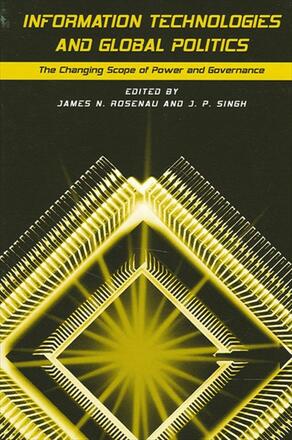
Information Technologies and Global Politics
The Changing Scope of Power and Governance
Alternative formats available from:
Examines how information technologies may be shifting power and authority away from the state.
Description
Returning to the fundamentals of political science, namely power and governance, this book studies the relationship between information technologies and global politics. Key issue-areas are carefully examined: security (including information warfare and terrorism); global consumption and production; international telecommunications; culture and identity formation; human rights; humanitarian assistance; the environment; and biotechnology. Each demonstrates the validity of the view now prevalent within international relations research—the shifting of power and the locus of authority away from the state. Three major conclusions are offered. First, the nation-state must now confront, support, or coexist with other international actors: non-governmental and intergovernmental organizations; multinational corporations; transnational social movements; and individuals. Second, our understanding of instrumental and structural powers must be reconfigured to account for digital information technologies. Finally, and perhaps most importantly, information technologies are now reconstituting actor identities and issues.
James N. Rosenau is University Professor of International Affairs at The George Washington University, and the author of many books, including Along the Domestic-Foreign Frontier: Exploring Governance in a Turbulent World, Turbulence in World Politics, and (with Mary Durfee) Thinking Theory Thoroughly: Coherent Approaches to an Incoherent World. J. P. Singh is Assistant Professor of Communication, Culture, and Technology at Georgetown University, and the author of Leapfrogging Development?: The Political Economy of Telecommunications Restructuring, also published by SUNY Press.
Reviews
"This is the most authoritative academic volume now available on the speculative interface between information technologies and global politics. It provides teachers with a valuable tool to stimulate students without imposing a dogmatic view of this emergent subject matter." — Richard A. Falk, author of Human Rights Horizons: The Pursuit of Justice in a Globalizing World
"The book makes an important contribution to understanding the broader implications of the developments in information technologies for global politics and global governance." — Phil Williams, Matthew B. Ridgeway Center for International Security Studies, University of Pittsburgh